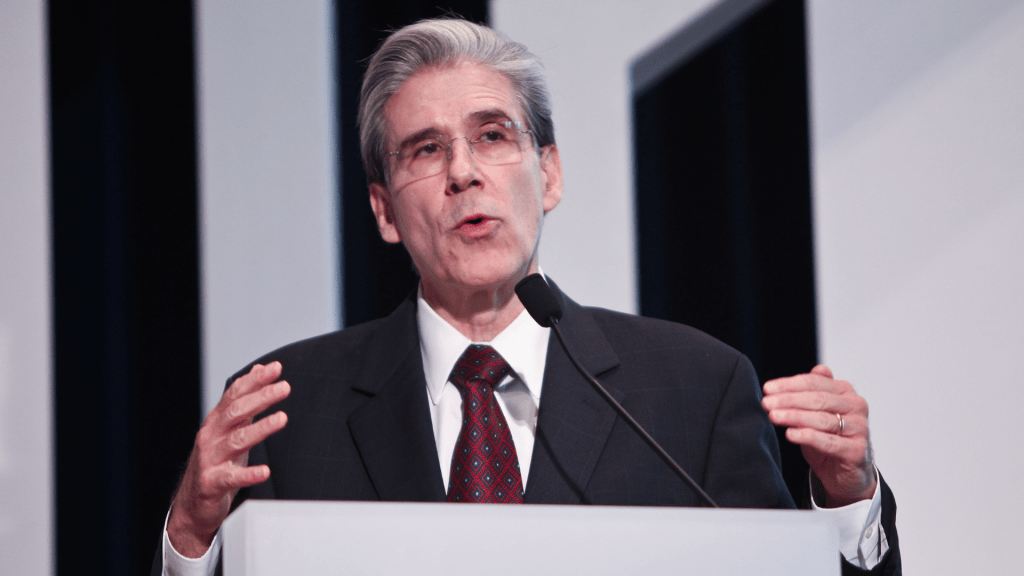We must harness our capacity for generosity to build a better future.
Highlights:
- Dr. Julio Frenk emphasizes the need to revive generosity and cooperation to strengthen health and education systems, drawing from Mexico’s history of solidarity during crises.
- His family’s survival as Jewish refugees in 1930s Mexico exemplifies the transformative power of generosity toward strangers, which he calls on society to reinforce amidst growing polarization.
- Frenk advocates for universities as spaces for free expression and respectful debate, nurturing leadership and transdisciplinary approaches to solve complex global problems.
- He underscores the importance of evidence-based policies to improve education quality and access while addressing recent declines in health indicators, such as vaccination coverage and life expectancy.
- Frenk calls for collective action to rebuild social cohesion, prioritize universal healthcare, and foster a future rooted in generosity, education, and well-being.

My paternal family was saved by an act of generosity
Julio Frenk
“My paternal family was saved by an act of generosity,” says Dr. Julio Frenk, former Secretary of Health in Mexico and, starting January 2025, the incoming president of the University of California, Los Angeles (UCLA). Dr. Frenk invites us to reflect on how to revive the spirit of cooperation and channel it into strengthening our health and education institutions.
Mexicans are cooperative, generous, and supportive. This has been demonstrated during major events like the 1985 earthquake, which led to the creation of hundreds of civil organizations addressing Mexico’s most urgent causes; the 2017 earthquake experienced by our generation; and most recently, Hurricane Otis, where many organizations are still working to aid Guerrero’s recovery. However, this essence of generosity is not new—it is an inheritance from previous generations.
Dr. Frenk’s paternal family exemplifies this. In 1930s Germany, his Jewish intellectual grandparents faced a climate of rising antisemitism that would culminate in the Holocaust. His grandfather, a physician who had volunteered in World War I, along with his grandmother and their two children (one of whom was Julio’s six-year-old father), realized that remaining in Germany was no longer possible. The danger was imminent. They spoke, prayed, and looked different.
The family found refuge in Mexico, where they could start over. “It’s easy to be generous with friends and family,” Julio emphasizes, “but being generous toward strangers is much harder.” This act of generosity by the Mexican people allowed them to rebuild their lives, form a family, and create a future from which Julio and his siblings are beneficiaries. “There are countless examples showing that this generosity exists, and it’s up to us to mobilize, nurture, and let it flourish,” he stresses. Yet this generosity must be reinforced, as the cohesion of our society is weakening.
There are countless examples showing that this generosity exists, and it’s up to us to mobilize, nurture, and let it flourish.
Julio Frenk
Health and education, essential pillars of progress and causes passionately championed by Dr. Julio Frenk, face multiple challenges, especially in Mexico. Today, we stand at a critical juncture.
The growing polarization is alarming and, I believe, one of the central problems of our time. Humanity has experienced similar periods before, and we know the consequences. Addressing this is urgent.
Julio Frenk
“The growing polarization is alarming and, I believe, one of the central problems of our time. Humanity has experienced similar periods before, and we know the consequences. Addressing this is urgent.” Having multiple strong identities (such as being Mexican, a farmer, Venezuelan, a doctor, a lawyer, an electrician, a teacher, a painter, a filmmaker, or an architect) enriches society. Problems arise when these identities are artificially constructed to define an “other” and exclude them based on differences. “People share 99.9% of their genomes, meaning we are essentially the same at our core,” Dr. Frenk explains.
“Universities must provide spaces for free expression,” he notes. While this freedom will often lead to disagreements, “in fact, that’s the foundation of science and the humanities. Nobody wants unanimous opinions.” The challenge lies in learning to disagree respectfully without dismissing, ignoring, or silencing opposing ideas—and certainly not resorting to violence to suppress them. Universities must promote open expression and debate. The ability to disagree can be taught and developed “not through lectures, but through immersive exercises and debates on pressing contemporary issues.” Within these university walls, leaders must also be nurtured. “For healthcare professionals like you and me, Sebastián, the ethical framework is clear: it’s one of service.” Effective leadership requires this ethic alongside a vision. What do we aim to achieve? What legacy do we want to leave? “I believe in institutions because they are the means to channel the collective creativity of humanity.” Additionally, disciplinary fragmentation must be overcome by embracing transdisciplinarity, where boundaries between fields are crossed to create holistic approaches to solving complex problems. Without cohesion, global challenges cannot be addressed.
I believe in institutions because they are the means to channel the collective creativity of humanity.
Julio Frenk
Education is the engine of the future, driving growth, critical thinking, leadership, teamwork, effective communication, and the ability to learn how to learn. It is a lifelong process. However, for education to be a real investment, public policies must be evidence-based. While progress has been made, access to education in Mexico remains limited, and the proliferation of low-quality universities is concerning. Opportunities must be expanded for more young people. Still, ensuring that those already in universities receive a quality education is equally important. Dr. Frenk advises students: “Demand quality, demand support from your professors, demand well-trained teachers,” as this is a unique opportunity to develop their potential and contribute to society.
Demand quality, demand support from your professors, demand well-trained teachers.
Julio Frenk
Since the end of the armed phase of the Mexican Revolution in the 20th century, the country has seen steady progress in health. Life expectancy increased annually, and infant mortality rates plummeted. Despite persistent social inequality, there were notable achievements, such as eradicating smallpox and eliminating polio. However, the COVID-19 pandemic in 2020 reversed these trends, setting Mexico back in its health indicators.
For the first time in a century, life expectancy experienced a widespread decline.
Julio Frenk
“For the first time in a century, life expectancy experienced a widespread decline. The country lost four years,” Dr. Frenk states. This setback, among the most severe globally, highlights the destruction of institutions. Furthermore, “the universal vaccination program was practically dismantled, leaving dangerously low coverage rates.”
“The new government has significant work to do—not to return to pre-2018 conditions, as many issues still needed resolution—but to rebuild what was undone and advance toward better health for all”. While past decades’ progress is evident, recent setbacks underscore the urgency of regaining momentum. Dr. Frenk states five health priorities must be addressed: improving vaccination coverage, reducing maternal mortality, ensuring medication supply, strengthening epidemiological surveillance, and restoring the health ministry’s budget. “Actions must be aligned to achieve our stated goals. If we ask the public, I believe they want a universal healthcare system with financial protection, high quality, and citizen participation.”
Education builds the future. Health is the present of the people.
Julio Frenk
The real challenge lies in mobilizing our capacity for generosity to build a more equitable future. We need to strengthen education and health because in Dr. Frenk’s words: “Education builds the future. Health is the present of the people.” Will we take the necessary steps? That depends on our ability to break artificial divisions, regain the path of social progress, and commit each generation to constructing a future where generosity and the common good prevail.











